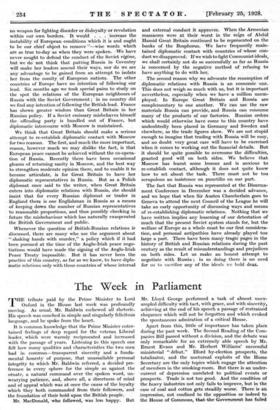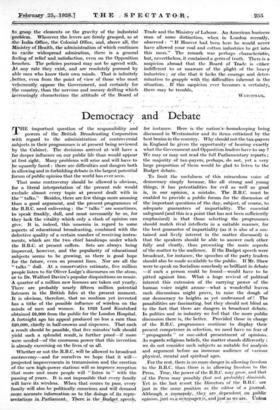The Week in Parliament
THE tribute paid by the Prime Minister to Lord Oicford in the House last week was profoundly moving. As usual, Mr. Baldwin eschewed all rhetoric. His speech was couched in simple and singularly felicitohs language, and he 'spoke from the heart.
It is common knowledge that the Prime Minister enter- tained feelings of deep regard for the veteran Liberal leader, which were warmly reciprocated and increased with the passage of years. Listening to this speech one felt how many qualities and characteristics the two men had in common—transparent sincerity and a funda- mental honesty of purpose, thEit unassailable personal integrity to which Mr. Baldwin referred, a decided pre- - ference in every sphere for the simple as against the Ornate, a natural command over the spoken word, un- wearying patience, and, above all; a-directness of mind and of appeal which was at once the cause of the loyalty which they both commanded from their followers, and the foundation of their hold upon the British people. ..
Mr. MacDonald,' who fcrllowed, was less happy. But Mr. Lloyd George performed a task of alMost unex- ampled'difficulty with tact, with grace, and with sincerity, achieving at the end of his speech a passage of restrained eloquence which will not be forgotten and which evoked the spontaneons admiration of a critical House.
Apart from thiS, little of impOrtance has taken PlaCe during the past week. The Second Reading of the Com- panies Bill passed without a division, and the debate was Only remarkable for an extremely able speech by Mr. Ernest Evans and Mr. Herbert Williams' successful ministerial " debut." Ilford by-election prospects; the totalizator, and the nocturnal exploits of the Home Secretary are the only topics which engage the attention Of members in the smoking-room. But there is an under- - current of 'depression unrelated- to: political events or prospects. Trade is not too good. And the condition of the heavy industries not only fails 'to improve, but in the Case of coal and cotton gets steadily worse. There' is tin "impression, riot confined to the opposition Or :indeed to the House of-Commons, that-the-Government-has failed to grasp the -elements or. the gravity of the industrial problem. Wherever the levers are firmly grasped, as at the India. Office, the Colonial Office, and, above all, the ,Ministry of Health, the administration of which continues to excite widespread admiration, there is a general -feeling of relief and, satisfaction, even on the Opposition ,benehes, The policies pursued may not be agreed with. At .any rate they exist, and are resolutely pursued by able men who know their own minds. - That is infinitely f.better, even from the point of, view of those who most vehemently_ oppose the. Government, and certainly for ;the country, than the nervous and uneasy drifting which increasingly characterizes the attitude of the Board of .Trade and the Ministry: of Labour. An American business man of some distinction, when -in -London repently, observed : "If Hoover. had, been .here he w.ould neyer have allowed your coal and cotton industries to get into this mess."' The remark was perhaps . characteristic, but, nevertheless, it contained a germ of truth. There.is a suspicion Abroad that the .Board of Tr,ade is either - indifferent to or unaware of - the plight:of the heavy -industries ; :or-else that it- lacks the courage. and deter- Mination to, grapple with the difficulties inherent in the situation. -if this suspicion ever becomes-. a certainty, -there . may be_trouble. . , .
WATqfMAN‘-









































 Previous page
Previous page